The massive rally will go down as a landmark moment—not just in Karnataka’s history, but in the nationwide movement to defend constitutional values
Mohamed Talha Siddibapa
MANGALURU — In what is now being called the largest public protest in Karnataka state, about a lakh people filled the sprawling Adyar-Kannur grounds in Mangaluru in Dakshina Kannada on Saturday to register their resentment at the Waqf Amendment Act.
The march stretched over a kilometre-wide area in a disciplined and powerful show of strength against the controversial legislation.
Organised under the united banner of Muslim organisations and supported by civil society voices, the protest was a vibrant yet peaceful assertion of democratic rights — and a major moment in India’s unfolding constitutional narrative.
As thousands of protestors raised their voices with posters, placards, and slogans, one unspoken question loomed large: Will the Narendra Modi government listen to the massive public outcry, or will it continue on a path seen by many as increasingly autocratic?
Speakers at the mammoth rally framed the issue as a constitutional crisis — not affecting any particular community. The crowd stood not just for Waqf, but for the country’s pluralism, rule of law, and democratic accountability.
From Shah Garden to Padil, Arkula, and all along NH-66, thousands marched with placards reading: “This Law: A Constitutional Aggression”, “Save Waqf, Save Constitution”, “Waqf is Our Heritage, Not for Sale”, and “Don’t Politicise Waqf – Resist Fascism”
The slogans revealed a deeper concern—that the legislation is not just about property, but about eroding rights and marginalising minorities under the guise of law.
What made the protest truly historic was not just its size, but its discipline and organisation, with over 2,000 volunteers ensuring order. Water bottles were removed, roads were kept accessible, and despite mobile networks being jammed, coordination remained seamless.
Even as temperatures soared, the sprawling rally stretched over a kilometre, filling roads, playgrounds, and even rooftops. Local businesses shut down in solidarity, while residents offered water and support to the participants.
Maulana Shafi Sa’adi, former president of Karnataka State Waqf Board, invoked history: “When the Shah Bano verdict challenged our beliefs, we united to uphold the Qur’an. Today, we are here again—for Waqf and for justice.”

Abdul Azeez Darimi of Karnataka Muslim Okkoota warned:
“Those who mocked Muslims as ‘puncture-wallahs’ are now puncturing the Constitution itself. But this human ocean says—we will not be silenced.”
Abdul Khader Musliyar of Bambar said: “This isn’t a Muslim issue. It’s a national issue. Mamata Banerjee has rightly refused to implement this law. We need such courage everywhere.”
Notable citizens who joined the gathering included former Mayor K. Ashraf, business leaders like Zakaria Jokatte and Sharif Whitestone, retired police officers, engineers, teachers, women, and youth, Scholars Mehboob Sakhafi, Usthanul Faizi, and Dr MSM Abdul Rasheed.
Abdul Nasir Lakkistaar, Dakshin Kannada District Waqf Advisory Committee Chairperson, stated: “This Act is not for the public good. It’s for capitalist control. We will not surrender even an inch of Waqf land.”
Speakers reminded the crowd that this protest was not against any religion or party. “This is not a Hindu-Muslim issue,” said Dr Abdul Rasheed, “This is about the Constitution. It is about protecting what makes India, India.”
The message was clear: Waqf is not communal property—it is public trust. It funds orphanages, colleges, hospitals, hostels, and community welfare. Undermining it is to undermine public service and minority empowerment.
The April 19 rally will go down as a landmark moment—not just in Karnataka’s history, but in the nationwide movement to defend constitutional values.
If democracy is to remain meaningful, the government must take this as a moral and political verdict. For now, civil society has spoken. Loud and clear.

